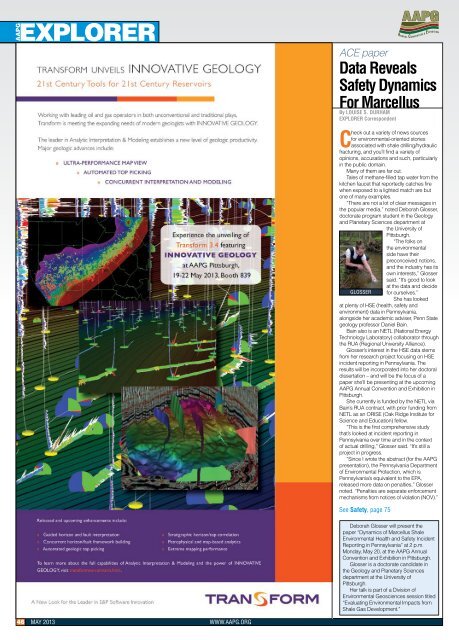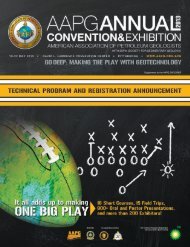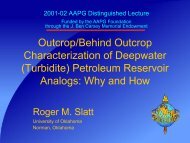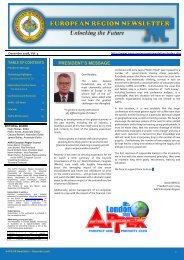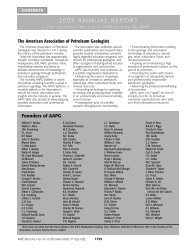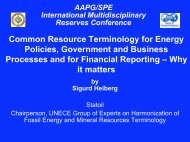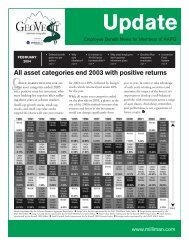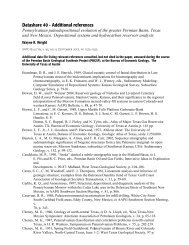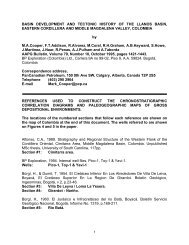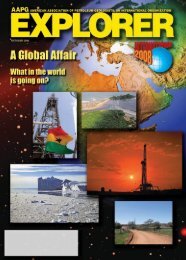Download - American Association of Petroleum Geologists
Download - American Association of Petroleum Geologists
Download - American Association of Petroleum Geologists
Create successful ePaper yourself
Turn your PDF publications into a flip-book with our unique Google optimized e-Paper software.
AAPG<br />
EXPLORER<br />
ACE paper<br />
Data Reveals<br />
Safety Dynamics<br />
For Marcellus<br />
By LOUISE S. DURHAM<br />
EXPLORER Correspondent<br />
Check out a variety <strong>of</strong> news sources<br />
for environmental-oriented stories<br />
associated with shale drilling/hydraulic<br />
fracturing, and you’ll find a variety <strong>of</strong><br />
opinions, accusations and such, particularly<br />
in the public domain.<br />
Many <strong>of</strong> them are far out.<br />
Tales <strong>of</strong> methane-filled tap water from the<br />
kitchen faucet that reportedly catches fire<br />
when exposed to a lighted match are but<br />
one <strong>of</strong> many examples.<br />
“There are not a lot <strong>of</strong> clear messages in<br />
the popular media,” noted Deborah Glosser,<br />
doctorate program student in the Geology<br />
and Planetary Sciences department at<br />
the University <strong>of</strong><br />
Pittsburgh.<br />
“The folks on<br />
the environmental<br />
side have their<br />
preconceived notions,<br />
and the industry has its<br />
own interests,” Glosser<br />
said. “It’s good to look<br />
GLOSSER<br />
at the data and decide<br />
for ourselves.”<br />
She has looked<br />
at plenty <strong>of</strong> HSE (health, safety and<br />
environment) data in Pennsylvania,<br />
alongside her academic adviser, Penn State<br />
geology pr<strong>of</strong>essor Daniel Bain.<br />
Bain also is an NETL (National Energy<br />
Technology Laboratory) collaborator through<br />
the RUA (Regional University Alliance).<br />
Glosser’s interest in the HSE data stems<br />
from her research project focusing on HSE<br />
incident reporting in Pennsylvania. The<br />
results will be incorporated into her doctoral<br />
dissertation – and will be the focus <strong>of</strong> a<br />
paper she’ll be presenting at the upcoming<br />
AAPG Annual Convention and Exhibition in<br />
Pittsburgh.<br />
She currently is funded by the NETL via<br />
Bain’s RUA contract, with prior funding from<br />
NETL as an ORISE (Oak Ridge Institute for<br />
Science and Education) fellow.<br />
“This is the first comprehensive study<br />
that’s looked at incident reporting in<br />
Pennsylvania over time and in the context<br />
<strong>of</strong> actual drilling,” Glosser said. “It’s still a<br />
project in progress.<br />
“Since I wrote the abstract (for the AAPG<br />
presentation), the Pennsylvania Department<br />
<strong>of</strong> Environmental Protection, which is<br />
Pennsylvania’s equivalent to the EPA,<br />
released more data on penalties,” Glosser<br />
noted. “Penalties are separate enforcement<br />
mechanisms from notices <strong>of</strong> violation (NOV).”<br />
See Safety, page 75<br />
Deborah Glosser will present the<br />
paper “Dynamics <strong>of</strong> Marcellus Shale<br />
Environmental Health and Safety Incident<br />
Reporting in Pennsylvania” at 2 p.m.<br />
Monday, May 20, at the AAPG Annual<br />
Convention and Exhibition in Pittsburgh.<br />
Glosser is a doctorate candidate in<br />
the Geology and Planetary Sciences<br />
department at the University <strong>of</strong><br />
Pittsburgh.<br />
Her talk is part <strong>of</strong> a Division <strong>of</strong><br />
Environmental Geosciences session titled<br />
“Evaluating Environmental Impacts from<br />
Shale Gas Development.”<br />
46 MAY 2013 WWW.AAPG.ORG


